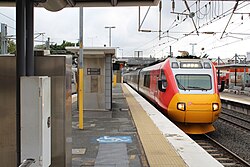Queensland Railways

Queensland Rail's Tilt Train at Bowen Hills in September 2016
|
|
| Industry | Railway operator |
|---|---|
| Founded | 31 July 1865 |
| Headquarters | Brisbane, Australia |
|
Area served
|
Queensland |
|
Key people
|
Neil Scales Acting CEO Michael Klug Former Chairman |
| Revenue | $1,932m (2011/12) |
| $692m (2011/12) | |
| $128m (2011/12) | |
|
Number of employees
|
7,312 (June 2012) |
| Parent | Government of Queensland |
| Website | queenslandrail |
Queensland Rail, also known as QR, is a railway operator in Queensland, Australia. Owned by the Queensland Government, Queensland Rail operates suburban and long-distance passenger services. It also owns and maintains approximately 8,000 kilometres of track in Queensland.
Queensland Railways was the first operator in the world to adopt narrow gauge (in this case 3 ft 6 in (1,067 mm)) for a main line, and this remains the systemwide gauge within Queensland today.
The colony of Queensland separated from New South Wales in 1859, and the new government was keen to facilitate development and immigration. Improved transport to the fertile Darling Downs region situated west of Toowoomba was seen as a priority. As adequate river transport was already established between the capital Brisbane and the then separate settlement of Ipswich, the railway commenced from the latter locality and the initial section, built over relatively flat, easy country opened to Bigge's Camp, at the eastern base of the Little Liverpool Range, on 31 July 1865. Called the Main Line, the only significant engineering work on that section was the bridge over the Bremer River to North Ipswich.
Tunneling excavation through the Little Liverpool Range delayed the opening of the next section to Gatton by 10 months, but the line was opened to Toowoomba in 1867, the ascent of the Main Range being the reason for the adoption of narrow gauge.
Built by the Queensland government to the unusual (for the time) gauge of 3 ft 6 in (1,067 mm), the line largely followed the alignment surveyed by a private company, the Moreton Bay Tramway Company, which had proposed to build a 4 ft 8 1⁄2 in (1,435 mm) horse-drawn tramway but had been unable to raise funds to do so beyond an initial start on earthworks.
...
Wikipedia
